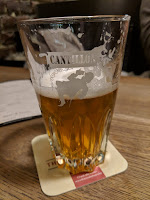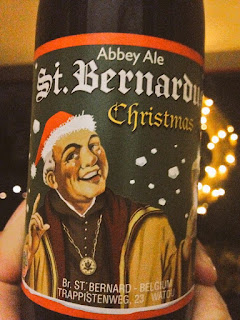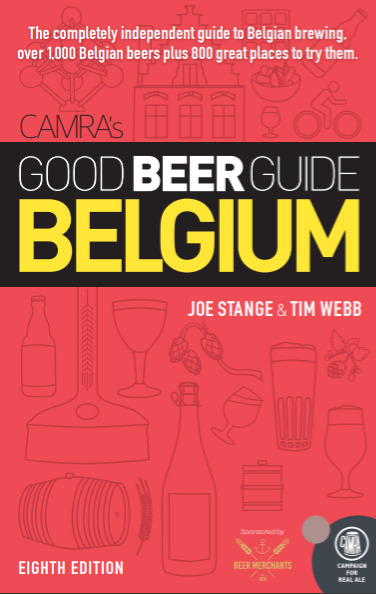 So, we're launching a podcast. Zach Johnston of UPROXX and myself. It's many months in the making, starting with a long series of those late-evening half-drunken "Wouldn't it be cool if..." talks that you don't really think will go anywhere.
So, we're launching a podcast. Zach Johnston of UPROXX and myself. It's many months in the making, starting with a long series of those late-evening half-drunken "Wouldn't it be cool if..." talks that you don't really think will go anywhere.
It's called One More Road for the Beer. Put it in your earholes as you travel home for the holidays, or on your next commute. Let us know what you think.
Each episode will focus on a different city; we're trying to keep each one to 30 or 40 minutes... We want to hit the highest of the highlights, plus a few obscurities -- the places you'd want to visit if you're on a business trip or only have a couple of days in town. And we aim to put it all in context. We want to put you in the atmosphere. We want the beer foam to tickle your nose. We want you to smell the local snacks.
In case you listen and want to look them up, here are the places we mention in the first show (and a map!):
Grand Place
Cantillon
Moeder Lambic Fontainas
Moeder Lambic Original
Poechenellekelder
Nüetnigenough
Fleur en Papier Doré
Les Brasseurs
Bier Tempel
Delhaize on Anspach
Petit Filou
We also mention beers from Cantillon, Senne, Tilquin, De Ranke, Oud Beersel, Dupont and Boon... more or less in that order.
Obviously we can only scratch the surface in each city. When possible we'll point you toward additional resources... In this case we're in my wheelhouse, and I'd humbly suggest Around Brussels in 80 Beers or the Good Beer Guide Belgium.
Notable correction: When talking about Cantillon in the 1970s, I should have said Jean-Pierre Van Roy was responsible for starting the nonprofit museum side of the operation. For some reason I just said Jean, which the name of Jean-Pierre's son who is now in charge. First-show nerves, maybe.
Next episode: Prague.
Friday, December 21, 2018
One More Road for the Beer: Brussels.
Monday, December 17, 2018
What's Up with All Those Belgian Christmas Beers, Anyway?
The world's best-known festival of Christmas and winter beers happened over the weekend. There they poured 187 different beers -- all made special for the season, all Belgian-brewed. Mind you, there are only about 240 breweries in Belgium. Not a bad ratio.
The Kerstbierfestival is in Essen, at Belgium's North Pole (near the Dutch border). The organizers go to great lengths to source every Belgian Christmas beer they can. Their first was in 1994, when they were able to find 38 of them. At that time there were about 110 breweries in the country.
What we can draw from this? For one, we can see that the number of special Christmas brews has expanded right alongside the number of small, independent breweries. That makes sense. It also makes sense (to me, anyway) that the existence of the festival in Essen has had something to do with it. Brewers know the event and want their beer to be a part of it.
So those are a couple of the possible answers to the question of why Christmas beers have become such a big thing in Belgium. Here are some other explanations I've heard or read at various times:
The faux-historical one: In the legendary old days the Belgian farmer-brewers would have had surplus grain after the harvest, so they would brew stronger ales to enjoy for the winter holidays. It's somewhat plausible and makes a nice story. I haven't found any evidence of it.
Palm started it: In 1947 it released Palm Dobbel, a somewhat stronger version of Palm delivered to clients as a thank you, and also to celebrate the brewery's bicentennial (based on a now dubious date shrouded in mist; in 1747 it would have been the De Hoorn farm brewery, which is older than that). Off the top of my head I can't think of any present-day Belgian holiday beers older than this one. That doesn't make it the first.
No, Artois started it: The story goes that Artois in Leuven introduced Stella as a Christmas beer named, sort of, for the Star of Bethlehem. However our friend Evan Rail has had a look at the brewing records. Trouble is, the brewery had fermentation problems with its earlier batches and didn't release the beer commercially until August 1927. From then on it was year-round. Thus I feel reasonably confident in declaring the Stella Christmas story to be nonsense. (Interestingly, the AB InBev site says it released Stella as "une bière de Noël, respectant en cela une coutume de l'époque," or "volgens de toenmalige traditie." That is, according to the custom of the time. So, maybe holiday beers really were a thing back then. Or, maybe we should be careful not to trust anything found on marketing websites, and this one in particular.)
Blame the British: Senne brewmaster Yvan De Baets -- whose Zinnebir Xmas is one of the best -- once told me his theory that the Belgians got the idea from the British, especially after World War I. This was a time when the Belgians were trying out pale ales and stouts too, so why not Christmas ales? (But as with other consumables, the Belgians have a special way of adding their own panache.) This is a rather plausible theory that also matches up somewhat with the timing of the Palm and Stella stories. If it was a "custom of the time," maybe this is why.
The capitalistic one: It's the money, stupid. You don't need to go to the Kerstbierfestival or fancy bottle shops to find Belgian Christmas beers. You can go to nearly any supermarket in Belgium and find endcap displays full of them. Or you can visit many corner cafés to find table tents and posters advertising brands like Palm Dobbel, Bush Noël, or Tongerlo Christmas, to name a few of the more common ones. They're nominally only available this one time of year, so many customers go for it. Not many brewers want to miss out on that.
More thoughts from De Baets: "As a brewer I can tell you what gets us moving, sometimes at least: We see clients, pubs, making an emphasis on Christmas beers at the end of the year and all the customers having their interest focused on them. So, what do we do? Well, we simply make one also. It maintains a interest in our products, it's as basic as that."
The truth may be some combination of all these things (er, minus the Stella bit): old traditions, good marketing sense, and a whole bunch of smaller breweries well versed in cranking out variety and oddities -- what's one more, to them? Why not join the fun?
The Kerstbierfestival is in Essen, at Belgium's North Pole (near the Dutch border). The organizers go to great lengths to source every Belgian Christmas beer they can. Their first was in 1994, when they were able to find 38 of them. At that time there were about 110 breweries in the country.
What we can draw from this? For one, we can see that the number of special Christmas brews has expanded right alongside the number of small, independent breweries. That makes sense. It also makes sense (to me, anyway) that the existence of the festival in Essen has had something to do with it. Brewers know the event and want their beer to be a part of it.
So those are a couple of the possible answers to the question of why Christmas beers have become such a big thing in Belgium. Here are some other explanations I've heard or read at various times:
The faux-historical one: In the legendary old days the Belgian farmer-brewers would have had surplus grain after the harvest, so they would brew stronger ales to enjoy for the winter holidays. It's somewhat plausible and makes a nice story. I haven't found any evidence of it.
Palm started it: In 1947 it released Palm Dobbel, a somewhat stronger version of Palm delivered to clients as a thank you, and also to celebrate the brewery's bicentennial (based on a now dubious date shrouded in mist; in 1747 it would have been the De Hoorn farm brewery, which is older than that). Off the top of my head I can't think of any present-day Belgian holiday beers older than this one. That doesn't make it the first.
No, Artois started it: The story goes that Artois in Leuven introduced Stella as a Christmas beer named, sort of, for the Star of Bethlehem. However our friend Evan Rail has had a look at the brewing records. Trouble is, the brewery had fermentation problems with its earlier batches and didn't release the beer commercially until August 1927. From then on it was year-round. Thus I feel reasonably confident in declaring the Stella Christmas story to be nonsense. (Interestingly, the AB InBev site says it released Stella as "une bière de Noël, respectant en cela une coutume de l'époque," or "volgens de toenmalige traditie." That is, according to the custom of the time. So, maybe holiday beers really were a thing back then. Or, maybe we should be careful not to trust anything found on marketing websites, and this one in particular.)
Blame the British: Senne brewmaster Yvan De Baets -- whose Zinnebir Xmas is one of the best -- once told me his theory that the Belgians got the idea from the British, especially after World War I. This was a time when the Belgians were trying out pale ales and stouts too, so why not Christmas ales? (But as with other consumables, the Belgians have a special way of adding their own panache.) This is a rather plausible theory that also matches up somewhat with the timing of the Palm and Stella stories. If it was a "custom of the time," maybe this is why.
The capitalistic one: It's the money, stupid. You don't need to go to the Kerstbierfestival or fancy bottle shops to find Belgian Christmas beers. You can go to nearly any supermarket in Belgium and find endcap displays full of them. Or you can visit many corner cafés to find table tents and posters advertising brands like Palm Dobbel, Bush Noël, or Tongerlo Christmas, to name a few of the more common ones. They're nominally only available this one time of year, so many customers go for it. Not many brewers want to miss out on that.
More thoughts from De Baets: "As a brewer I can tell you what gets us moving, sometimes at least: We see clients, pubs, making an emphasis on Christmas beers at the end of the year and all the customers having their interest focused on them. So, what do we do? Well, we simply make one also. It maintains a interest in our products, it's as basic as that."
The truth may be some combination of all these things (er, minus the Stella bit): old traditions, good marketing sense, and a whole bunch of smaller breweries well versed in cranking out variety and oddities -- what's one more, to them? Why not join the fun?
Subscribe to:
Comments (Atom)






